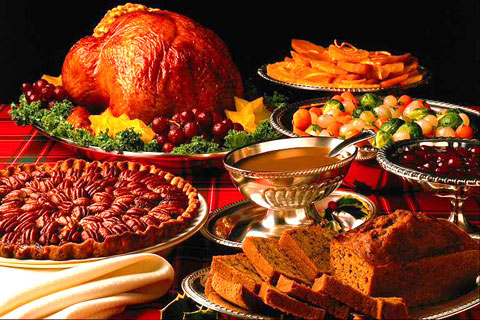|
Written By Jack Zhong
Edited By Josephine McGowan Every year, a lucky turkey gets pardoned, and his many friends end up on the tables of many families across America. At the thanksgiving feast this past weekend, we piled on the turkey, cranberry sauce, sweet potatoes, pies, stuffing, gravy, ice cream, etc. Smiling approvingly at family and friends, we devour our overloaded plate, testing the limits of our stomach. After the dinner, we felt sleepy and were immobilized on the couch. With drowsy voices, many across the US discussed with fellow feasters about how the turkey made them sleepy with its high levels of tryptophan, before making battle plans for getting discounts and door-buster deals on Black Friday. It is commonly believed that the high level of tryptophan in the turkey is the cause of the drowsiness. An amino acid common in meats, tryptophan has a sedating effect on the human body, and tryptophan can be chemically converted to the neurotransmitter serotonin. Then, serotonin can then be converted to melatonin, and both serotonin and melatonin will cause sleepiness. However, the theory of high levels of tryptophan in turkey causing sleepiness does not hold up under further examination. Turkey does not have more tryptophan than other meats. Equivalent servings of chicken, turkey, and beef contain equivalent amounts of tryptophan. Typically, the turkey, chicken, or beef will have about 320mg of tryptophan per 3.5oz of meat. The other types of meat are not usually associated with drowsiness like turkey, even though they have roughly the same levels of tryptophan. Thus, turkey does not have “high levels of tryptophan” as many would believe. Alternatively, the quantity of food consumed may play a bigger role in causing drowsiness. Even if turkey has the same level of tryptophan per ounce as other meats, eating ungodly amounts of turkey would mean taking in more tryptophan; the ensuing increase in serotonin and melatonin levels and cause sleepiness. In response to food intake, the nervous system affects the body’s energy level. The parasympathetic nervous system (PSNS) in our body activates during eating and digestion. Think of the PSNS as the part of the nervous system that tells the body to “rest and digest.” It is the opposite of the sympathetic nervous system (SNS), which activates during high intensity activities and danger. The SNS acts in opposition to the PSNS, and it is active in “fight or flight” situations, like running into a wild bear in a forest. The huge volumes of food eaten at Thanksgiving will increase activation of the PSNS and deactivate the SNS, telling the body to rest. In addition to the tryptophan from turkey contributing to drowsiness, other thanksgiving food contains a lot of carbohydrates or carbs. For example, potatoes, bread, stuffing, apple pie with ice cream comes loaded with a lot of starch and sugar, both of which are carbs (Figure 4). Eating food high in carbs reduces the time it takes for healthy sleepers to go from full awake to sleep (Afaghi et al. 2007). Digesting the carbs will increase blood glucose levels, which will cause a spike in insulin as the body attempt to lower blood glucose levels (Burdakov et al. 2006). The increase in insulin helps intake of large neutral amino acids (LNAA) into muscle, but not tryptophan. The increase in tryptophan to LNAA ratio will help tryptophan enter the brain. In addition, glucose has been shown to inhibit orexin neurons, which promotes wakefulness and control consciousness and metabolism. Further, the alcoholic beverages like wine and beer add to the drowsiness. Alcohol is a depressant, reducing arousal in different areas of the brain. Not to mention, the process of cooking a ludicrous quantity of food and socializing with relatives and friends can be physically taxing, further adding to the tiredness one feels after. Thanksgiving dinner. From studies on tryptophan levels to our understanding of the central nervous system, we see that turkeys should be pardoned for causing the sleepiness we felt after Thanksgiving dinner. Rather, our choices to overstuff our faces with meat, carbs, and alcohol that ultimately led to our downfall on the couch.
0 Comments
Leave a Reply. |
Categories
All
Archives
April 2024
|

